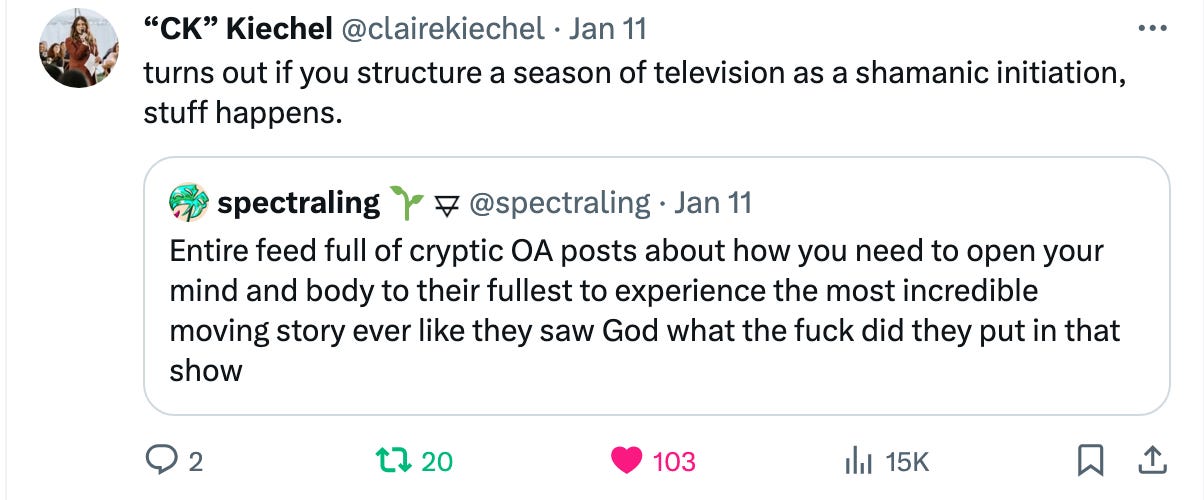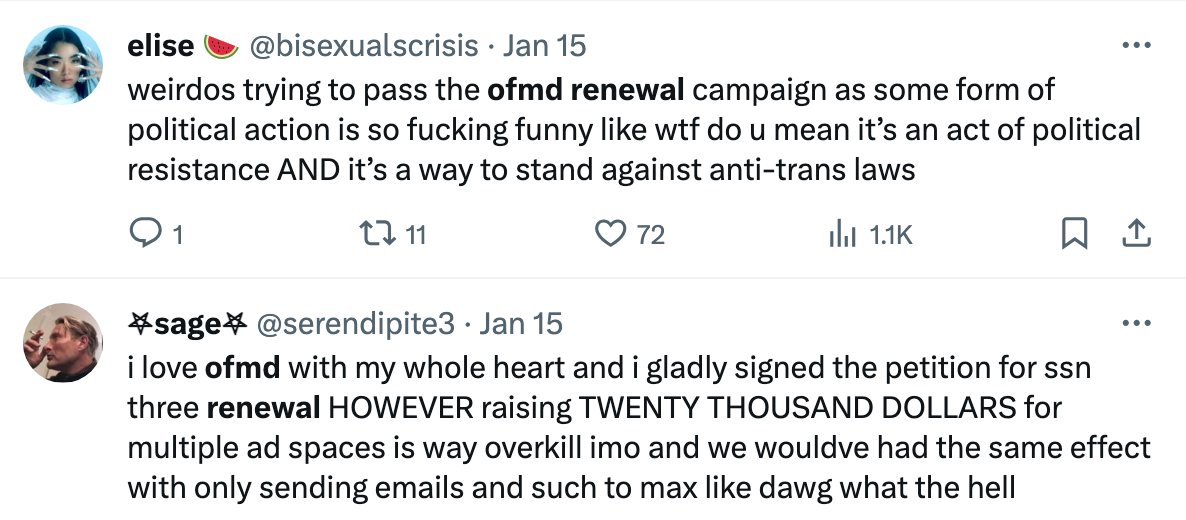Friday Tchotchke #28: Acting at maximum cringe capacity
What we talk about when we talk about renewal campaigns
The OA, the best television show of the 21st century,1 went viral last week, thanks to an out-of-context clip from TikTok with horrible music layered over it getting crossposted to Twitter.
This stimulated a reactive round of OA earnestposting across the regrettable platform, which I gladly took part in, attempting (somewhat uselessly) to communicate the life-changing nature of the show to people predisposed by the initial viral tweet to think it irredeemably corny.
Thanks to the sitewide trend brought on by this back-and-forth, The OA surfaced above the collective consciousness for the first time since its cancellation in 2019, and people began sharing their memories of the show and their fond hopes for its return. That cancellation, coming unexpectedly after Netflix’s unstinting support of the show as one of its first top-line dramatic originals, was a harbinger of the crash to come. Now it’s comically rare that original streaming dramas shows receive more than two seasons.
In a live conversation on the Angel Neurosis OA fan Discord server which I attended last Saturday, co-creator Zal Batmanglij was asked something along the lines of “how do you feel about people making fun of the show?” His response (sadly the session was unrecorded) had to do with how he knew that for any work of art which can truly, deeply connect with people, there has to be a number of people for whom it completely doesn’t work. Challenging art will always have its detractors, and for The OA, whose twenty episodes essentially form the kernel of a powerful New Age religion, the girls that get it get it, and everyone else simply doesn’t. That simply wasn’t good enough for Netflix; but hopefully Batmanglij and his co-creator Brit Marling will get their Twin Peaks: The Return moment sooner rather than later, and pick up the story where they left off. “Let those who can’t handle it learn to dance with it at the five dimension-jumping movements of success.” Or something.
Despite fandom’s rise as a hegemonic cultural mode of engagement over the last decade, concerted public displays of enthusiasm still have a tendency to become flashpoints for criticism and mockery. The recent reaction against the #RenewAsACrew campaign to save HBO Max’s Our Flag Means Death, cancelled after yep, you guessed it, two critically-acclaimed seasons, exemplifies this.
The campaign has reached Times Square billboard/LED truck-level saturation, thanks to the devotion of the show’s fans, but naturally there are plenty of people who think it’s a waste of time.
The level at which shameless devotion to pop culture becomes uncomfortable to witness for outsiders is probably lower for specifically nerdy, queer pop culture that shows like OFMD exemplify than woo-woo artsy hipster The OA. Even so, The OA’s renewal campaign back in 2019 also received plenty of similar “it’s not that serious” backlash; OFMD’s is a bit more excruciating because of the constant strawmanning about how dare people spend money on/promote something so frivolous when there’s a genocide happening, &c &c. The call is, for the most part, coming from inside the house, as it always is—there is nobody more likely to declare that someone is doing fandom wrong than another fan. Especially when that controversial thing money is involved, breaking a central taboo of the (increasingly archaic) “gift economy” of fandom.
Last year for Business Insider I wrote about the renewal campaigning organization Viewers for Quality Television, an advocacy group which developed a cozy relationship with network executives in the 80s and 90s and helped keep favored shows on the air. It was nothing new at the time—Star Trek had been famously saved by a renewal campaign in the 60s—but VQT presented a suited-up, “professional” alternative to full-on geekery which perhaps made collective devotion more palatable, in a time before fandom was big business.
VQT wound down as the Golden Age of Television revved up, alongside the internet as a means of organizing, perceiving that their time had come and gone. But in the face of how completely disengaged streaming services and networks seem to be from the desires of their audiences, and how we might soon very well be facing a drought of quality television, I wonder if the time has finally come for a spiritual successor to take the stage. Accusations of frivolity and pointlessness which are easy to levy at single-fandom campaigns acting at maximum cringe capacity might not stand up against a phalanx of devoted viewers acting in concert to support art they believe in.
Banger of the week
Yes, better than The Terror (2018) but only by a very small margin.



